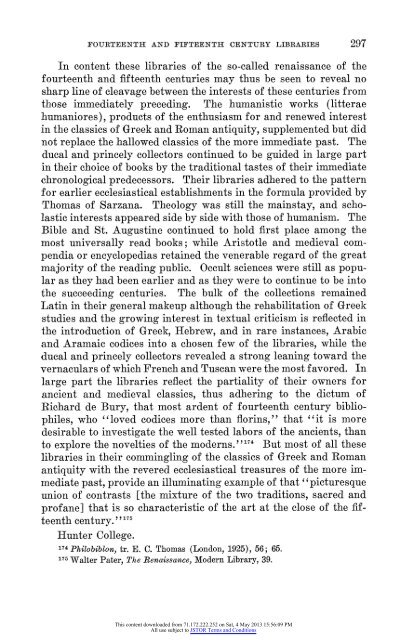The Intellectual Interests Reflected in Libraries of the Fourteenth and ...
The Intellectual Interests Reflected in Libraries of the Fourteenth and ...
The Intellectual Interests Reflected in Libraries of the Fourteenth and ...
You also want an ePaper? Increase the reach of your titles
YUMPU automatically turns print PDFs into web optimized ePapers that Google loves.
FOURTEENTH AND FIFTEENTH CENTURY LIBRARIES 297<br />
In content <strong>the</strong>se libraries <strong>of</strong> <strong>the</strong> so-called renaissance <strong>of</strong> <strong>the</strong><br />
fourteenth <strong>and</strong> fifteenth centuries may thus be seen to reveal no<br />
sharp l<strong>in</strong>e <strong>of</strong> cleavage between <strong>the</strong> <strong>in</strong>terests <strong>of</strong> <strong>the</strong>se centuries from<br />
those immediately preced<strong>in</strong>g. <strong>The</strong> humanistic works (litterae<br />
humaniores), products <strong>of</strong> <strong>the</strong> enthusiasm for <strong>and</strong> renewed <strong>in</strong>terest<br />
<strong>in</strong> <strong>the</strong> classics <strong>of</strong> Greek <strong>and</strong> Roman antiquity, supplemented but did<br />
not replace <strong>the</strong> hallowed classics <strong>of</strong> <strong>the</strong> more immediate past. <strong>The</strong><br />
ducal <strong>and</strong> pr<strong>in</strong>cely collectors cont<strong>in</strong>ued to be guided <strong>in</strong> large part<br />
<strong>in</strong> <strong>the</strong>ir choice <strong>of</strong> books by <strong>the</strong> traditional tastes <strong>of</strong> <strong>the</strong>ir immediate<br />
chronological predecessors. <strong>The</strong>ir libraries adhered to <strong>the</strong> pattern<br />
for earlier ecclesiastical establishments <strong>in</strong> <strong>the</strong> formula provided by<br />
Thomas <strong>of</strong> Sarzana. <strong>The</strong>ology was still <strong>the</strong> ma<strong>in</strong>stay, <strong>and</strong> scholastic<br />
<strong>in</strong>terests appeared side by side with those <strong>of</strong> humanism. <strong>The</strong><br />
Bible <strong>and</strong> St. August<strong>in</strong>e cont<strong>in</strong>ued to hold first place among <strong>the</strong><br />
most universally read books; while Aristotle <strong>and</strong> medieval compendia<br />
or encyclopedias reta<strong>in</strong>ed <strong>the</strong> venerable regard <strong>of</strong> <strong>the</strong> great<br />
majority <strong>of</strong> <strong>the</strong> read<strong>in</strong>g public. Occult sciences were still as popular<br />
as <strong>the</strong>y had been earlier <strong>and</strong> as <strong>the</strong>y were to cont<strong>in</strong>ue to be <strong>in</strong>to<br />
<strong>the</strong> succeed<strong>in</strong>g centuries. <strong>The</strong> bulk <strong>of</strong> <strong>the</strong> collections rema<strong>in</strong>ed<br />
Lat<strong>in</strong> <strong>in</strong> <strong>the</strong>ir general makeup although <strong>the</strong> rehabilitation <strong>of</strong> Greek<br />
studies <strong>and</strong> <strong>the</strong> grow<strong>in</strong>g <strong>in</strong>terest <strong>in</strong> textual criticism is reflected <strong>in</strong><br />
<strong>the</strong> <strong>in</strong>troduction <strong>of</strong> Greek, Hebrew, <strong>and</strong> <strong>in</strong> rare <strong>in</strong>stances, Arabic<br />
<strong>and</strong> Aramaic codices <strong>in</strong>to a chosen few <strong>of</strong> <strong>the</strong> libraries, while <strong>the</strong><br />
ducal <strong>and</strong> pr<strong>in</strong>cely collectors revealed a strong lean<strong>in</strong>g toward <strong>the</strong><br />
vernaculars <strong>of</strong> which French <strong>and</strong> Tuscan were <strong>the</strong> most favored. In<br />
large part <strong>the</strong> libraries reflect <strong>the</strong> partiality <strong>of</strong> <strong>the</strong>ir owners for<br />
ancient <strong>and</strong> medieval classics, thus adher<strong>in</strong>g to <strong>the</strong> dictum <strong>of</strong><br />
Richard de Bury, that most ardent <strong>of</strong> fourteenth century bibliophiles,<br />
who "loved codices more than flor<strong>in</strong>s," that "it is more<br />
desirable to <strong>in</strong>vestigate <strong>the</strong> well tested labors <strong>of</strong> <strong>the</strong> ancients, than<br />
to explore <strong>the</strong> novelties <strong>of</strong> <strong>the</strong> moderns."'74 But most <strong>of</strong> all <strong>the</strong>se<br />
libraries <strong>in</strong> <strong>the</strong>ir comm<strong>in</strong>gl<strong>in</strong>g <strong>of</strong> <strong>the</strong> classics <strong>of</strong> Greek <strong>and</strong> Roman<br />
antiquity with <strong>the</strong> revered ecclesiastical treasures <strong>of</strong> <strong>the</strong> more immediate<br />
past, provide an illum<strong>in</strong>at<strong>in</strong>g example <strong>of</strong> that "picturesque<br />
union <strong>of</strong> contrasts [<strong>the</strong> mixture <strong>of</strong> <strong>the</strong> two traditions, sacred <strong>and</strong><br />
pr<strong>of</strong>ane] that is so characteristic <strong>of</strong> <strong>the</strong> art at <strong>the</strong> close <strong>of</strong> <strong>the</strong> fifteenth<br />
century."175<br />
Hunter College.<br />
174Philobiblon, tr. E. C. Thomas (London, 1925), 56; 65.<br />
175 Walter Pater, <strong>The</strong> Renaissance, Modern Library, 39.<br />
This content downloaded from 71.172.222.252 on Sat, 4 May 2013 15:56:09 PM<br />
All use subject to JSTOR Terms <strong>and</strong> Conditions

















